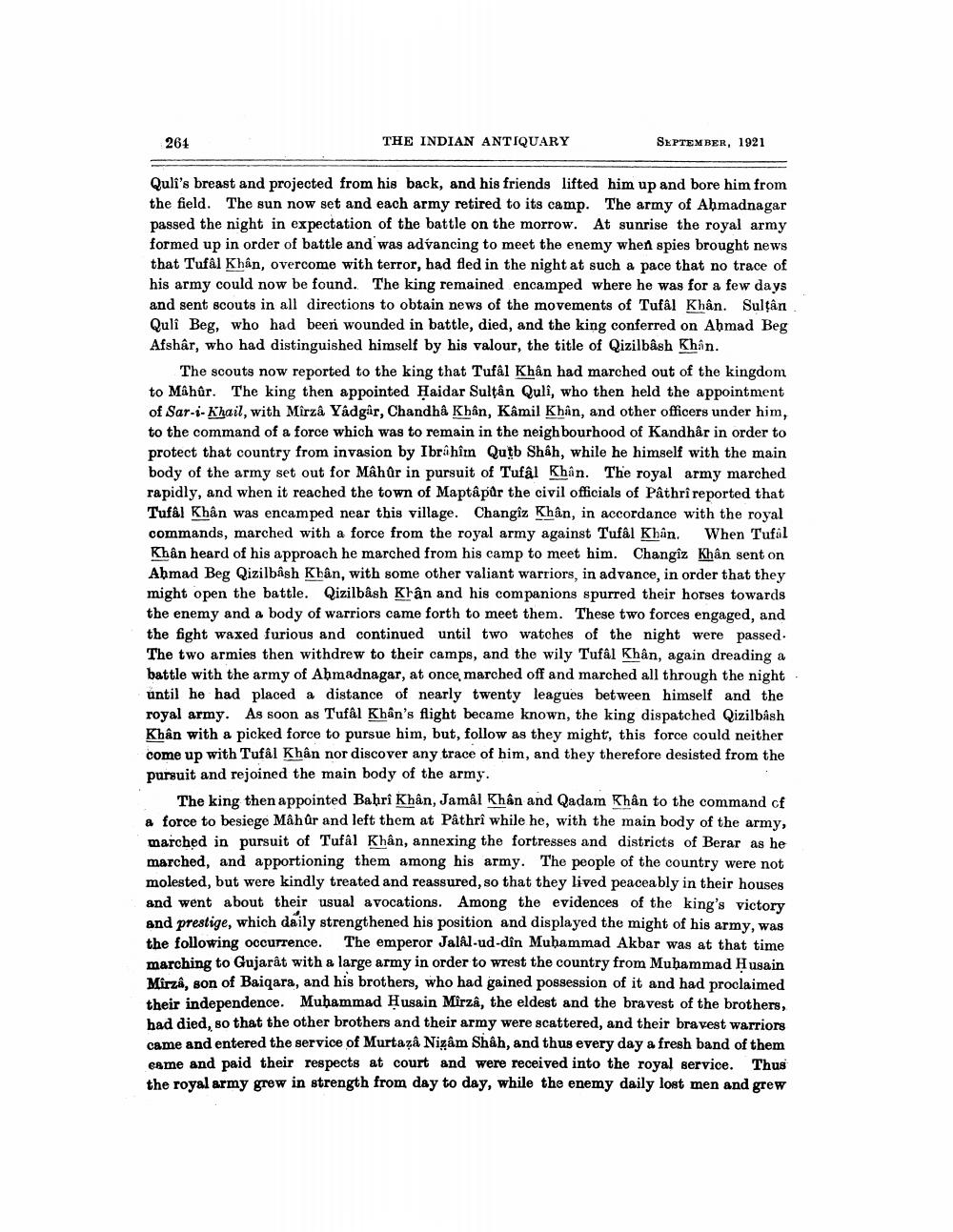________________
261
THE INDIAN ANTIQUARY
SEPTEMBER, 1921
Quli's breast and projected from his back, and his friends lifted him up and bore him from the field. The sun now set and each army retired to its camp. The army of Ahmadnagar passed the night in expectation of the battle on the morrow. At sunrise the royal army formed up in order of battle and was advancing to meet the enemy when spies brought news that Tufal Khân, overcome with terror, had fled in the night at such a pace that no trace of his army could now be found. The king remained encamped where he was for a few days and sent scouts in all directions to obtain news of the movements of Tufal Khân. Sultan Quli Beg, who had been wounded in battle, died, and the king conferred on Ahmad Beg Afshâr, who had distinguished himself by his valour, the title of Qizilbâsh Khân.
The scouts now reported to the king that Tufal Khân had marched out of the kingdom to Mahûr. The king then appointed Haidar Sultân Quli, who then held the appointment of Sar-:- Khail, with Mirza Yadgar, Chandhå Khân, Kâmil Khân, and other officers under him, to the command of a force which was to remain in the neighbourhood of Kandhår in order to protect that country from invasion by Ibrahîm Qutb Shah, while he himself with the main body of the army set out for Mâhûr in pursuit of Tufal Khân. The royal army marched rapidly, and when it reached the town of Maptâ půr the civil officials of Pâthrî reported that Tufal Khân was encamped near this village. Changiz Khân, in accordance with the royal commands, marched with a force from the royal army against Tufal Khan. When Tufal Khân heard of his approach he marched from his camp to meet him. Changiz Khân sent on Ahmad Beg Qizilbâsh Khân, with some other valiant warriors, in advance, in order that they might open the battle. Qizilbâsh Khan and his companions spurred their horses towards the enemy and a body of warriors came forth to meet them. These two forces engaged, and the fight waxed furious and continued until two watches of the night were passed. The two armies then withdrew to their camps, and the wily Tufal Khan, again dreading a battle with the army of Ahmadnagar, at once marched off and marched all through the night until he had placed a distance of nearly twenty leagues between himself and the royal army. As soon as Tufal Khân's flight became known, the king dispatched Qizilbâsh Khân with a picked force to pursue him, but, follow as they might, this force could neither come up with Tufâl Khân nor discover any trace of him, and they therefore desisted from the pursuit and rejoined the main body of the army.
The king then appointed Bahrî Khân, Jamal Khan and Qadam Khân to the command of a force to besiege Mâhur and left them at Pâthrî while he, with the main body of the army, marched in pursuit of Tufal Khân, annexing the fortresses and districts of Berar as he marched, and apportioning them among his army. The people of the country were not molested, but were kindly treated and reassured, so that they lived peaceably in their houses and went about their usual a vocations. Among the evidences of the king's victory and prestige, which daily strengthened his position and displayed the might of his army, was the following occurrence. The emperor Jalal-ud-dîn Muhammad Akbar was at that time marching to Gujarat with a large army in order to wrest the country from Muhammad Husain Mirza, son of Baiqara, and his brothers, who had gained possession of it and had proclaimed their independence. Muhammad Husain Mirzâ, the eldest and the bravest of the brothers, had died, so that the other brothers and their army were scattered, and their bravest warriors came and entered the service of Murtaza Nizam Shah, and thus every day a fresh band of them eame and paid their respects at court and were received into the royal service. Thus the royal army grew in strength from day to day, while the enemy daily lost men and grew




